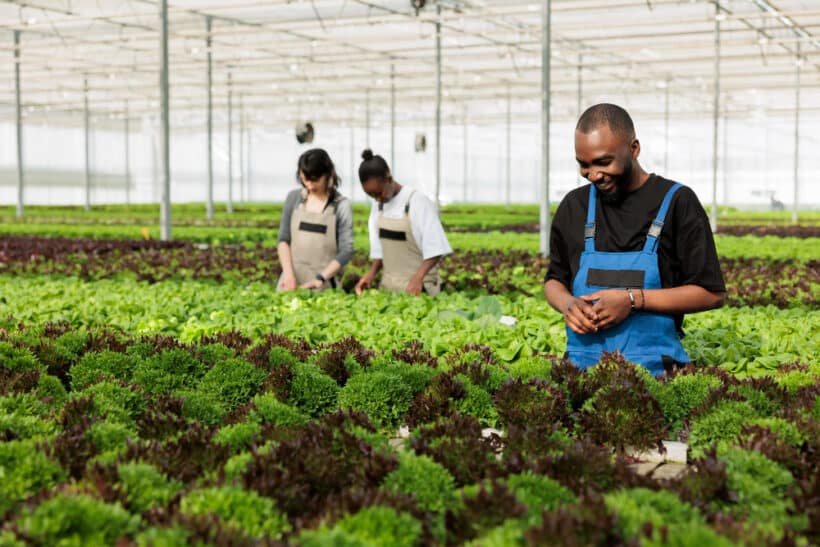New Zealand is globally recognized for its breathtaking landscapes and thriving agricultural sector. Agriculture plays a vital role in the country’s economy, making up a significant portion of its GDP and employing thousands of people. For those interested in pursuing a career in farming or agriculture, New Zealand offers a wealth of opportunities, particularly in roles related to dairy farming, horticulture, forestry, and sheep farming. What makes New Zealand an even more appealing destination is the possibility of securing agriculture jobs with visa sponsorship, providing international workers the chance to live and work in one of the world’s most picturesque and agriculturally rich countries.
As New Zealand’s agricultural sector continues to grow, the demand for skilled labor has increased, creating an opening for international workers to fill these roles. With competitive salaries, visa sponsorship opportunities, and a chance to experience rural life in New Zealand, now is the perfect time to start planning your career in agriculture abroad.
In this article, we’ll explore the various types of agriculture jobs in New Zealand with visa sponsorship available in 2024, the benefits of working in the agricultural sector, the visa options for international workers, and tips on how to secure your dream job. Whether you’re looking to work on a dairy farm, manage crops, or oversee forestry operations, this guide will help you navigate your path to starting a farming career in New Zealand.
Why Choose a Career in Agriculture in New Zealand?
New Zealand’s agriculture sector is diverse and dynamic, offering a wide range of career opportunities for people from different backgrounds. From its famous dairy farms to expansive orchards and vineyards, the country is an agricultural powerhouse. Here are a few reasons why pursuing an agriculture job in New Zealand can be a rewarding choice:
1. High Demand for Agricultural Workers
New Zealand’s agricultural industry is facing a labor shortage, particularly in key areas such as dairy farming, horticulture, and sheep farming. This shortage has created a high demand for skilled and unskilled labor, making it easier for international workers to secure jobs in the sector. With the country’s reliance on agriculture for economic growth, employers are keen to attract international talent to fill these roles.
2. Visa Sponsorship Opportunities
Many New Zealand employers offer visa sponsorship for agricultural workers, making it easier for international candidates to obtain the necessary work permits and visas. The country’s Essential Skills Work Visa and Seasonal Employment Schemes provide pathways for foreigners to live and work in New Zealand legally, with some visa options leading to permanent residency.
3. Competitive Salaries and Benefits
Agriculture jobs in New Zealand offer competitive salaries, with opportunities for career growth and development. While wages vary depending on the specific role and level of experience, farm workers, farm managers, and horticultural specialists can expect to earn between NZD $40,000 and $80,000 annually. Some positions may also include benefits such as accommodation, meals, and transportation, making it a financially viable option for international workers.
4. Work-Life Balance and Quality of Life
New Zealand is known for its relaxed and balanced lifestyle, making it an attractive destination for those looking to escape the hustle and bustle of city life. The agricultural sector offers an opportunity to work in rural areas with stunning natural landscapes, fresh air, and a sense of community. Many workers appreciate the opportunity to live and work in peaceful surroundings while being part of a critical industry that supports the nation’s economy.
5. Pathways to Permanent Residency
Working in New Zealand’s agricultural sector can also provide a pathway to permanent residency (PR). For those who develop a long-term career in the country, several visa categories allow workers to transition from temporary employment to permanent residency, offering stability and the chance to build a future in New Zealand.
Types of Agriculture Jobs in New Zealand with Visa Sponsorship
New Zealand’s agriculture sector is diverse, providing job opportunities across various sub-sectors, including dairy farming, horticulture, forestry, crop management, and livestock farming. Below are some of the most common agriculture jobs available in New Zealand with visa sponsorship:
1. Dairy Farm Worker
New Zealand’s dairy industry is one of the largest in the world, and the country is known for producing high-quality dairy products for both domestic consumption and export. Dairy farming jobs are in high demand, particularly in rural areas where large dairy farms require a significant workforce to manage daily operations.
Key responsibilities of a dairy farm worker include:
- Milking cows, either manually or using automated systems
- Feeding livestock and ensuring they have access to clean water
- Maintaining farm equipment and machinery
- Assisting with breeding programs and calf-rearing
- Monitoring the health and well-being of cattle and reporting any issues to the farm manager
Average salary: Dairy farm workers in New Zealand can expect to earn between NZD $45,000 and $60,000 per year, depending on experience and location.
Visa sponsorship: Many dairy farms in New Zealand offer visa sponsorship for international workers, particularly those with experience in the dairy industry.
2. Horticultural Worker
New Zealand’s horticulture industry is booming, with the country producing a wide variety of fruits, vegetables, and flowers for export. Jobs in horticulture include working on orchards, vineyards, and farms that grow produce such as kiwifruit, apples, avocados, grapes, and more. Seasonal work is particularly common in this sector, with opportunities for visa sponsorship under the Recognised Seasonal Employer (RSE) Scheme.
Key responsibilities of a horticultural worker include:
- Planting, pruning, and harvesting crops
- Sorting, packing, and preparing produce for shipment
- Operating machinery and irrigation systems
- Ensuring crops are free from pests and diseases
- Assisting with soil management and fertilization
Average salary: Horticultural workers typically earn between NZD $40,000 and $55,000 per year, with additional pay for overtime or peak seasons.
Visa sponsorship: The RSE Scheme allows international workers to take on seasonal roles in the horticulture industry, and many employers provide visa sponsorship for those who wish to return for multiple seasons.
3. Sheep and Beef Farm Worker
Sheep and beef farming are integral parts of New Zealand’s agricultural landscape, with the country being one of the top exporters of lamb and beef worldwide. Working on a sheep or beef farm involves managing livestock, maintaining pastures, and assisting with breeding programs. These farms often operate in remote areas, offering international workers the chance to experience rural life in New Zealand.
Key responsibilities of a sheep and beef farm worker include:
- Feeding and caring for sheep and cattle
- Managing pastures and ensuring livestock have access to grazing areas
- Assisting with the breeding and lambing or calving processes
- Maintaining farm equipment, fences, and other infrastructure
- Monitoring the health and welfare of livestock and providing treatment when necessary
Average salary: Sheep and beef farm workers can expect to earn between NZD $40,000 and $65,000 annually, depending on the size of the farm and level of responsibility.
Visa sponsorship: Many sheep and beef farms offer visa sponsorship for experienced international workers, particularly in areas where local labor shortages exist.
4. Agricultural Machinery Operator
Agricultural machinery operators play a vital role in the day-to-day operations of farms across New Zealand. These workers are responsible for operating and maintaining machinery such as tractors, harvesters, plows, and irrigation systems. The ability to handle heavy machinery is essential for efficient crop management and livestock farming.
Key responsibilities of an agricultural machinery operator include:
- Operating tractors, harvesters, and other farming equipment
- Maintaining and repairing machinery to ensure it functions properly
- Assisting with planting, harvesting, and fertilizing crops
- Managing irrigation systems and ensuring fields receive adequate water
- Transporting goods and materials across the farm or between farms
Average salary: Agricultural machinery operators typically earn between NZD $45,000 and $70,000 annually, depending on the complexity of the machinery and the size of the farm.
Visa sponsorship: Skilled machinery operators are in high demand, and many agricultural employers provide visa sponsorship for international workers with the necessary experience and qualifications.
5. Farm Manager
For those with extensive experience in agriculture, a farm manager role offers an opportunity to oversee the entire operation of a farm. Farm managers are responsible for coordinating activities such as planting, harvesting, livestock management, and financial planning. They also ensure that farms meet regulatory and environmental standards while maximizing productivity.
Key responsibilities of a farm manager include:
- Planning and implementing crop rotations, planting schedules, and livestock management
- Managing farm staff and delegating tasks
- Budgeting, financial planning, and purchasing supplies
- Ensuring compliance with health, safety, and environmental regulations
- Maintaining farm infrastructure, machinery, and equipment
Average salary: Farm managers can earn between NZD $70,000 and $120,000 annually, depending on the size and complexity of the farm operation.
Visa sponsorship: Many farm manager positions offer visa sponsorship, particularly for those with extensive experience and qualifications in agriculture management.
Visa Options for Agriculture Jobs in New Zealand
For international workers looking to start a career in New Zealand’s agricultural sector, obtaining the right visa is essential. New Zealand offers several visa options for agricultural workers, ranging from temporary seasonal visas to long-term work visas that can lead to permanent residency. Below are the most common visa categories for agricultural workers:
1. Essential Skills Work Visa
The Essential Skills Work Visa is one of the most popular visa options for international workers in New Zealand’s agricultural sector. This visa allows workers to stay in New Zealand for up to five years, depending on the skill level of the job and the duration of the employment contract.
Key features of the Essential Skills Work Visa:
- Available for skilled and semi-skilled agricultural roles, including farm workers, machinery operators, and farm managers
- Requires a job offer from a New Zealand employer willing to sponsor the visa
- Valid for one to five years, depending on the job’s skill level and duration
- Provides the option to apply for permanent residency after gaining work experience in New Zealand
2. Recognised Seasonal Employer (RSE) Scheme Visa
The Recognised Seasonal Employer (RSE) Scheme Visa is designed for workers who wish to take on seasonal agricultural roles in New Zealand, particularly in the horticulture and viticulture sectors. This visa allows workers to stay in New Zealand for up to seven months during the peak season, with the possibility of returning for multiple seasons.
Key features of the RSE Scheme Visa:
- Designed for seasonal workers in the horticulture and viticulture industries
- Allows workers to stay in New Zealand for up to seven months per year
- Provides the flexibility to return for multiple seasons, subject to employer sponsorship
- Suitable for unskilled or semi-skilled workers looking for short-term employment
3. Work to Residence Visa
The Work to Residence Visa is a pathway for skilled workers in New Zealand to transition from a temporary work visa to permanent residency. This visa is ideal for those who want to build a long-term career in New Zealand’s agricultural sector. After working in New Zealand for a specified period, visa holders can apply for permanent residency.
Key features of the Work to Residence Visa:
- Allows workers to apply for permanent residency after two years of employment in New Zealand
- Available for skilled agricultural roles, including farm managers and specialized technicians
- Requires a job offer from a New Zealand employer willing to sponsor the visa
- Provides access to healthcare, education, and other benefits available to permanent residents
4. Temporary Work Visa
For international workers looking for short-term agricultural work, the Temporary Work Visa allows individuals to work in New Zealand for a specified period, usually up to 12 months. This visa is suitable for those participating in agricultural exchange programs or short-term employment contracts.
Key features of the Temporary Work Visa:
- Suitable for short-term agricultural roles, including farm work and seasonal employment
- Valid for up to 12 months, with the possibility of extension in some cases
- Requires a job offer from a New Zealand employer willing to sponsor the visa
- Suitable for workers looking to gain international experience in agriculture before returning to their home country
How to Apply for Agriculture Jobs in New Zealand with Visa Sponsorship
Securing an agriculture job in New Zealand with visa sponsorship requires careful planning, research, and preparation. Here’s a step-by-step guide to help you navigate the process:
1. Research Agricultural Employers Offering Visa Sponsorship
Start by identifying New Zealand employers in the agricultural sector who offer visa sponsorship for international workers. Many large farms, agricultural companies, and horticultural businesses actively recruit international talent to fill labor shortages. Use online job boards such as Seek, Trade Me Jobs, and Indeed to search for agriculture jobs that mention visa sponsorship.
2. Ensure You Meet the Qualifications
Before applying for an agriculture job in New Zealand, make sure you meet the necessary qualifications and experience requirements. While some roles, such as farm workers, may not require formal qualifications, other positions, such as farm managers or machinery operators, may require specific certifications or experience.
3. Prepare Your Application Materials
Once you’ve identified potential employers, prepare a strong application that highlights your skills, experience, and qualifications in agriculture. Your application should include:
- CV/Resume: Clearly outline your agricultural experience, certifications, and any additional skills or qualifications.
- Cover Letter: Write a compelling cover letter explaining why you are interested in working in New Zealand’s agricultural sector and how your skills align with the employer’s needs.
- References: Include references from previous employers who can speak to your abilities and work ethic in agricultural settings.
4. Submit Your Application and Follow Up
Submit your application through the employer’s preferred method, such as via their website or through a job board. After submitting your application, follow up with the employer to express your continued interest in the position and inquire about the next steps in the recruitment process.
5. Apply for the Appropriate Visa
Once you’ve secured a job offer, your employer will begin the visa sponsorship process on your behalf. You’ll need to apply for the appropriate visa, such as the Essential Skills Work Visa or the RSE Scheme Visa, and provide all necessary documentation, including proof of your job offer, work experience, and qualifications.
Conclusion: Start Your Farming Career in New Zealand with Visa Sponsorship
New Zealand’s agricultural sector offers a wealth of opportunities for international workers looking to start a farming career abroad. With competitive salaries, visa sponsorship options, and the chance to live in one of the world’s most beautiful countries, working in New Zealand’s agriculture industry is a rewarding and fulfilling choice.
By following the steps outlined in this guide and preparing a strong application, you can secure an agriculture job in New Zealand with visa sponsorship in 2024. Whether you’re interested in dairy farming, horticulture, or livestock management, New Zealand provides a pathway for you to build a successful career in agriculture. Don’t wait—apply now and take the first step toward starting your farming career in New Zealand!











